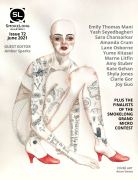I love the peripheral narrator in this piece, and how the narrator’s ambiguous identity defamiliarizes the narrative. How would the story be different if told in third person, or from the point of view of the grieving mother or father?
The piece is nonfiction, written from the perspective of me observing my grandparents. Given the limitations of the form, I think the most economical choice was to write the piece from the position of an intimate observer who objectively notices how these people are falling apart in various ways. The narrator looks on with pity as the malnourished try to nourish other beings and fail to provide the required nutrients, mirroring their own care of themselves. This perspective would be lost if it were written from the P.O.V. of the mother/father.
I also love the progression of images, including ones we can taste: “…coddled grapes”; “…bread she keeps in a cardboard box”; “…brown sugar crystals in water.” Was there a method to selecting these sensory details, or is your writing process more freely associative?
The scene is a moment in a kitchen that hasn’t changed much in half a decade and that I know well. The details were intuitively chosen.
What’s it like having your recent memoir, One and Half of You, out in the world?
To be honest, it’s strange. I worked on this book and its corresponding soundtrack for over a decade, and releasing it into a pandemic world brings with it a lot of distance. Since I’m unable to give live readings and tour, I’m not always sure if my work is reaching folks. But then sometimes I get a poignant review or a surprise email and I remember that my work has and will find its audience. Of course, there are virtual events in the meantime, but I think we all just need less time online, and more time connecting as people. Soon.
It’s a vulnerable thing to release a memoir––and this one in particular since it involves not just my own narrative, but pieces of my brother’s coming-of-age, as well as my relationship with a former lover––so I feel protective not only of myself, but of them, too.



 In September 2022 SmokeLong launched a workshop environment/community christened SmokeLong Fitness. This community workshop is happening right now on our dedicated workshop site. If you choose to join us, you will work in a small group of around 15-20 participants to give and receive feedback on flash narratives—one new writing task each week.
In September 2022 SmokeLong launched a workshop environment/community christened SmokeLong Fitness. This community workshop is happening right now on our dedicated workshop site. If you choose to join us, you will work in a small group of around 15-20 participants to give and receive feedback on flash narratives—one new writing task each week.